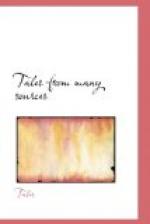Before the summer was over he was familiar with every barrack-room and guard-room in the place; he had food to eat and coppers to spare, and he shared his bits with the mongrel dogs who lived, as he did, on the good-nature of the garrison.
It must be confessed that neatness was not among John Broom’s virtues. He looped his rags together with bits of string, and wasted his pence or lost them. The soldiers standing at the bar would often give him a drink out of their pewter-pots. It choked him at first, and then he got used to it, and liked it. Some relics of Miss Betty’s teachings kept him honest. He would not condescend to sip by the way out of the soldiers’ jugs and bottles, as other errand-boys did, but he came to feel rather proud of laying his twopence on the counter, and emptying his own pot of beer with a grimace to the bystanders through the glass at the bottom.
One day he was winking through the froth of a pint of porter at the canteen sergeant’s daughter, who was in fits of laughing, when the pewter was knocked out of his grasp, and the big Highlander’s hand was laid on his shoulder and bore him twenty or thirty yards from the place in one swoop.
“I’ll trouble ye to give me your attention,” said the Highlander, when they came to a standstill, “and to speak the truth. Did ye ever see me the worse of liquor?”
John Broom had several remembrances of the clearest kind to that effect, so he put up his arms to shield his head from the probable blow, and said, “Yes, M’Alister.”
“How often?” asked the Scotchman.
“I never counted,” said John Broom; “pretty often.”
“How many good-conduct stripes do you ken me to have lost of your ain knowledge?”
“Three, M’Alister.”
“Is there a finer man than me in the regiment?” asked the Highlander, drawing up his head.
“That there’s not,” said John Broom, warmly.
“Our sairgent, now,” drawled the Scotchman, “wad ye say he was a better man than me?”
“Nothing like so good,” said John Broom, sincerely.
“And what d’ye suppose, man,” said the Highlander, firing with sudden passion, till the light of his clear blue eyes seemed to pierce John Broom’s very soul—“what d’ye suppose has hindered me that I’m not sairgent, when yon man is? What has keepit me from being an officer, that had served my country in twa battles when oor quartermaster hadna enlisted? Wha gets my money? What lost me my stripes? What loses me decent folks’ respect and, waur than that, my ain? What gars a hand that can grip a broadsword tremble like a woman’s? What fills the canteen and the kirkyard? What robs a man of health and wealth and peace? What ruins weans and women, and makes mair homes desolate than war? Drink, man, drink! The deevil of drink!”
It was not till the glare in his eyes had paled that John Broom ventured to speak. Then he said,—
“Why don’t ye give it up, M’Alister?”




